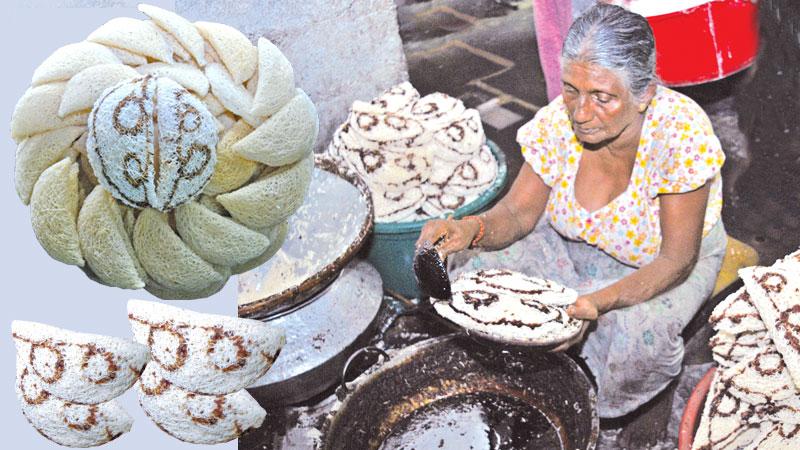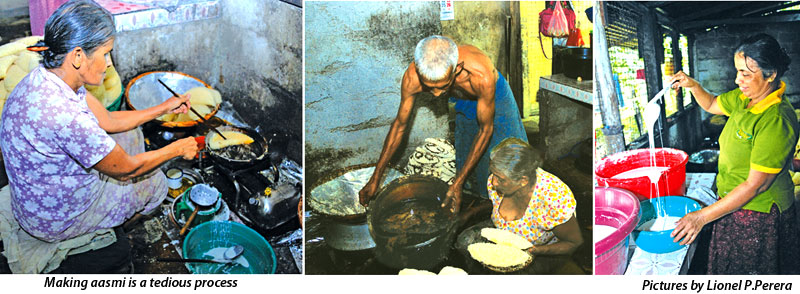
These unsophisticated, simple villagers do not aspire to become doctors, engineers or architects. They are content with what they have been rewarded by God, as they believe. Even normal perils of life, they attribute to Karma and continue to live with it. Villagers in their simple lives have reposed implicit faith in honest labour. They depend entirely on their innate strength to eke out a meagre living without depending on external forces.
Rathnawathie Menike, Muthu Menike, Wasantha and Sudharma are a few courageous women who have taken unto themselves the burden of life, pinning hope in their inner strength. They have made their village Opatha, on Nelundeniya Road, Alawwa, the cynosure for indigenous sweets such as, aasmi keum, kokis and peni walalu.
Making aasmi is a tedious process. Its success depends largely on patience and concentration on the part of the makers. The main ingredient is davul kurundu found in village areas. Aasmi is made on a large scale in Opatha, which has a big demand from other parts of the country.
Pioneer
Wasantha, a charming, simple woman is a pioneer in the aasmi industry. Her household members welcomed us with endearing hospitality, symbolic in village life. Wasantha who is in the forefront, is the live wire of this cottage industry. Several middle aged women were busy making aasmi on kerosene cookers of the 1960s. The finished products could be seen everywhere. It was Wasantha’s aged mother, the 72 year old Adikari Sudarma who gave the finishing touches to the twice - fried aasmi.

“In our area, none knew the art of making aasmi. It was my mother who taught me. Those days we made aasmi for weddings and danas but never accepted anything in return,” she said. She was proud of her daughter Wasantha who looked after her well.
Wasantha, has become the role-model to the others in the locality. She recounted how she wriggled out of the rigours of life and became the breadwinner of her family when her husband lost his job at the Thulhiriya Textile Factory.
Despite her humble origin, today, Wasantha is a big business woman, supplying aasmi to several markets. A good Samaritan, Dahanayake, is the principal buyer of Wasantha’s product, she boasted. Her daughter also gives a helping hand to make the family industry more viable.
Customers flow in to buy aasmi, especially, during the Sinhala New Year. At present there are six female workers in Wasantha’s workplace. They work from 8 a.m. to 5 p.m. Kandy, Dambulla, Hiriwaduna, Ja ela and Giriulla are the key centres that distribute aasmi to other areas. Gunaratne Menike, an employee under Wasantha narrated her story. ‘I learned the art of making aasmi only after coming here, twelve years ago. I make around 350 aasmis a day’.
“It was sheer initiative and grit that drove me to launch this project. Six more families in the village thrive on this business, she added.
“Do not waste time pinning hopes on the unattainable. How fortunate I am today with my own business started with meagre resources?. Have implicit faith in your courage and determination to succeed in life”, is Wasantha’s advice to others.
Raw material
Rathnawathie Menike too flourished in her industry. “About two months ago we too started making aasmi. We make about 100 aasmi a week. This is the sole means of our subsistence”, she said.
Muthumenike, had launched her aasmi business about five years ago. My daughter in Anuradhapura supplies me with the main raw material, davul kurundu, which is aplenty. Our sales soar, about 6,000 or more daily, during the Sinhala New Year time, she said. She has indomitable faith in her courage despite her troubled leg. When modern technology has transformed life beyond recognition, Sri Lanka’s cottage industries have become nearly extinct in view of escalating prices of commodities.
A bottle of coconut oil which was less than Rs100 a year ago has skyrocketed to more than Rs. 300 not to speak of wheat flour and sugar prices today. Making kevum, kokis and aasmi is a cumbersome job when one has to sit by the fire throughout the day to fry them. Exhaustion and fatigue have added to their misery.
The days are not far for local sweets such as kevum, kokis, aasmi and peni walalu to die a slow and painful death.
The Rathnawathie Menikes, Muthumenikes Sudarmas and Wasanthas, who were courageous enough to give a new lease of life with a few dose of oxygen to the dying traditional sweets, deserve special commendation. That the indigenous sweets will survive for sometime without being eclipsed by new arrivals in supermarkets, is left to the vagaries of time.
Translated by Michael Kittanpahuwa
